Assessment of the UK Legal System for Business Law BMP4002
VerifiedAdded on 2023/06/17
|9
|2595
|166
Report
AI Summary
This report provides an analysis of the UK legal system, focusing on its classifications, sources, and application to business law. It defines laws and identifies the UK's legal systems, explaining classifications such as civil and criminal law, and detailing the roles of the High Court and Supreme Court. The report also explores case law and legislation as sources of law, including delegated legislation. Furthermore, it examines the UK law-making process in the context of employment law, covering statutory duties of employers and actions related to wrongful and unfair dismissal. The document is contributed by a student and available on Desklib, a platform offering AI-based study tools and solved assignments for students.
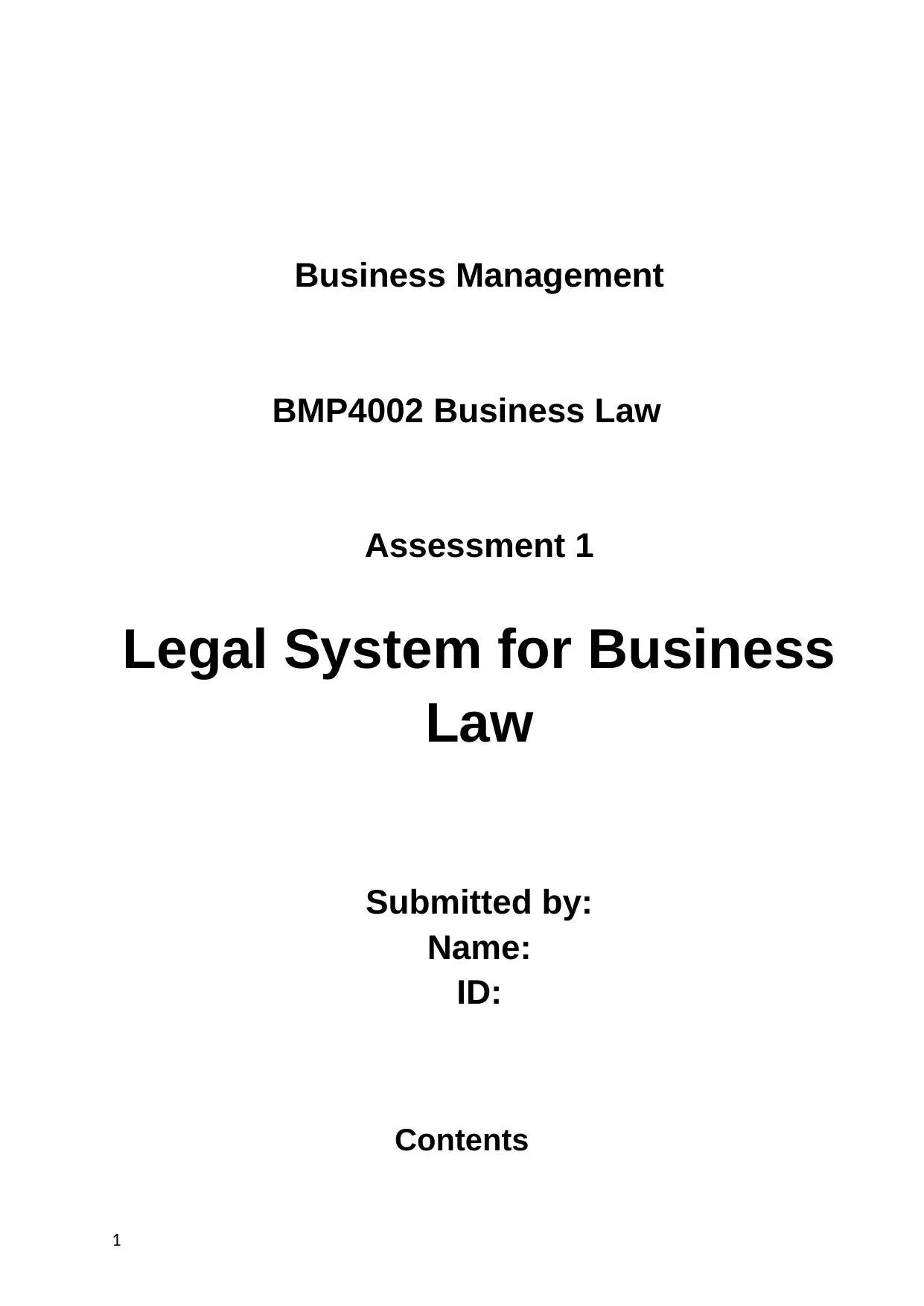
Business Management
BMP4002 Business Law
Assessment 1
Legal System for Business
Law
Submitted by:
Name:
ID:
Contents
1
BMP4002 Business Law
Assessment 1
Legal System for Business
Law
Submitted by:
Name:
ID:
Contents
1
Paraphrase This Document
Need a fresh take? Get an instant paraphrase of this document with our AI Paraphraser
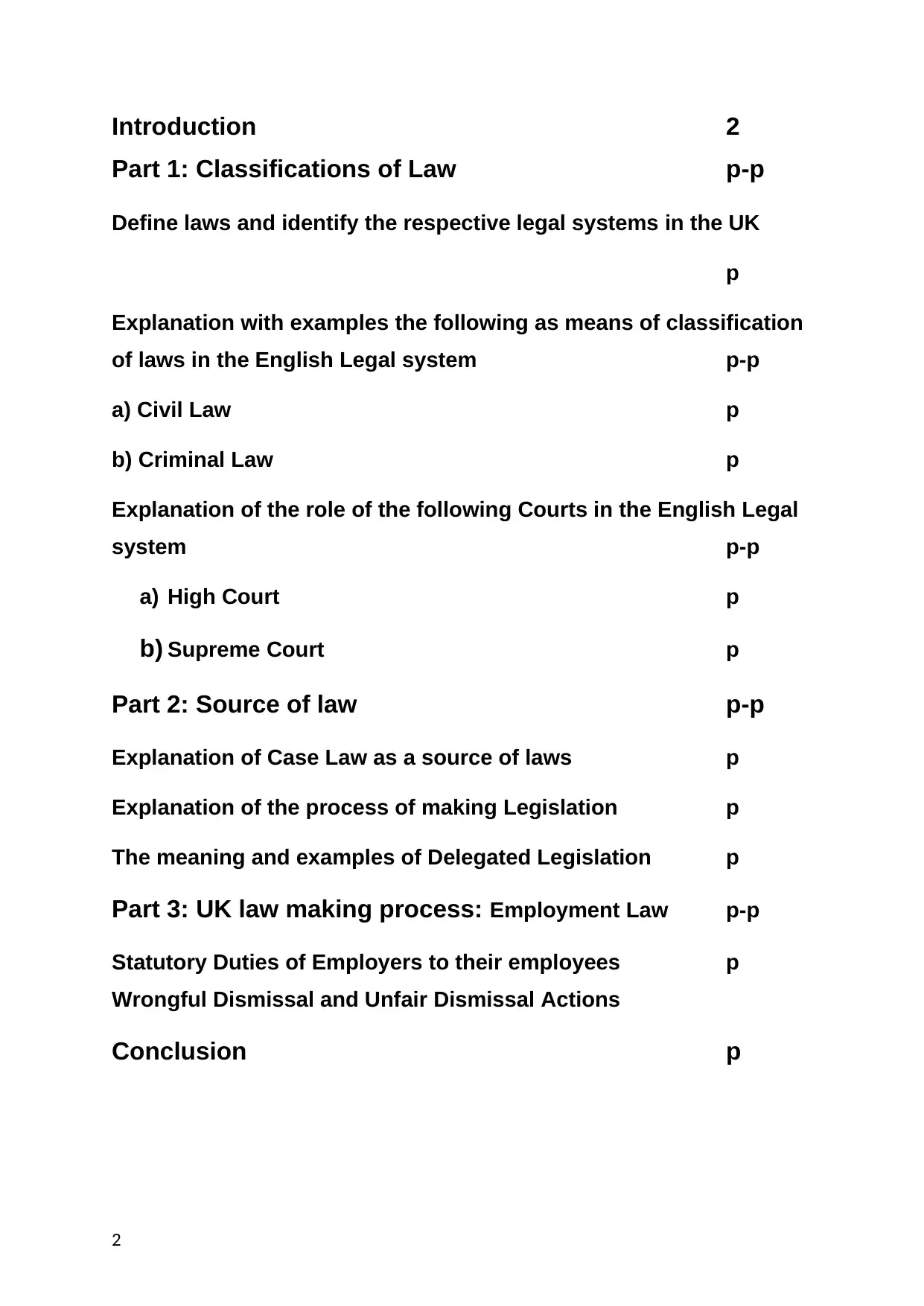
Introduction 2
Part 1: Classifications of Law p-p
Define laws and identify the respective legal systems in the UK
p
Explanation with examples the following as means of classification
of laws in the English Legal system p-p
a) Civil Law p
b) Criminal Law p
Explanation of the role of the following Courts in the English Legal
system p-p
a) High Court p
b) Supreme Court p
Part 2: Source of law p-p
Explanation of Case Law as a source of laws p
Explanation of the process of making Legislation p
The meaning and examples of Delegated Legislation p
Part 3: UK law making process: Employment Law p-p
Statutory Duties of Employers to their employees p
Wrongful Dismissal and Unfair Dismissal Actions
Conclusion p
2
Part 1: Classifications of Law p-p
Define laws and identify the respective legal systems in the UK
p
Explanation with examples the following as means of classification
of laws in the English Legal system p-p
a) Civil Law p
b) Criminal Law p
Explanation of the role of the following Courts in the English Legal
system p-p
a) High Court p
b) Supreme Court p
Part 2: Source of law p-p
Explanation of Case Law as a source of laws p
Explanation of the process of making Legislation p
The meaning and examples of Delegated Legislation p
Part 3: UK law making process: Employment Law p-p
Statutory Duties of Employers to their employees p
Wrongful Dismissal and Unfair Dismissal Actions
Conclusion p
2
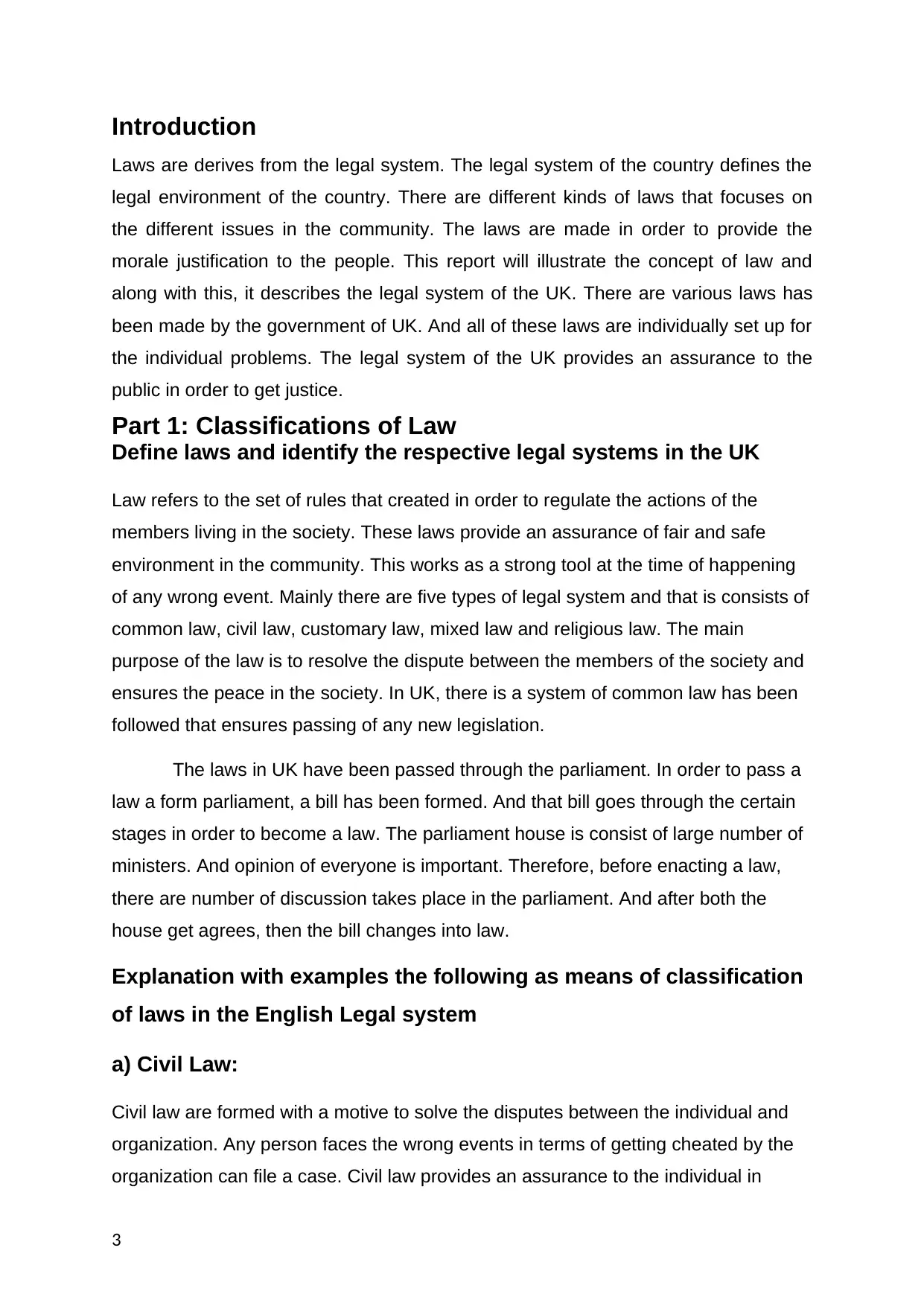
Introduction
Laws are derives from the legal system. The legal system of the country defines the
legal environment of the country. There are different kinds of laws that focuses on
the different issues in the community. The laws are made in order to provide the
morale justification to the people. This report will illustrate the concept of law and
along with this, it describes the legal system of the UK. There are various laws has
been made by the government of UK. And all of these laws are individually set up for
the individual problems. The legal system of the UK provides an assurance to the
public in order to get justice.
Part 1: Classifications of Law
Define laws and identify the respective legal systems in the UK
Law refers to the set of rules that created in order to regulate the actions of the
members living in the society. These laws provide an assurance of fair and safe
environment in the community. This works as a strong tool at the time of happening
of any wrong event. Mainly there are five types of legal system and that is consists of
common law, civil law, customary law, mixed law and religious law. The main
purpose of the law is to resolve the dispute between the members of the society and
ensures the peace in the society. In UK, there is a system of common law has been
followed that ensures passing of any new legislation.
The laws in UK have been passed through the parliament. In order to pass a
law a form parliament, a bill has been formed. And that bill goes through the certain
stages in order to become a law. The parliament house is consist of large number of
ministers. And opinion of everyone is important. Therefore, before enacting a law,
there are number of discussion takes place in the parliament. And after both the
house get agrees, then the bill changes into law.
Explanation with examples the following as means of classification
of laws in the English Legal system
a) Civil Law:
Civil law are formed with a motive to solve the disputes between the individual and
organization. Any person faces the wrong events in terms of getting cheated by the
organization can file a case. Civil law provides an assurance to the individual in
3
Laws are derives from the legal system. The legal system of the country defines the
legal environment of the country. There are different kinds of laws that focuses on
the different issues in the community. The laws are made in order to provide the
morale justification to the people. This report will illustrate the concept of law and
along with this, it describes the legal system of the UK. There are various laws has
been made by the government of UK. And all of these laws are individually set up for
the individual problems. The legal system of the UK provides an assurance to the
public in order to get justice.
Part 1: Classifications of Law
Define laws and identify the respective legal systems in the UK
Law refers to the set of rules that created in order to regulate the actions of the
members living in the society. These laws provide an assurance of fair and safe
environment in the community. This works as a strong tool at the time of happening
of any wrong event. Mainly there are five types of legal system and that is consists of
common law, civil law, customary law, mixed law and religious law. The main
purpose of the law is to resolve the dispute between the members of the society and
ensures the peace in the society. In UK, there is a system of common law has been
followed that ensures passing of any new legislation.
The laws in UK have been passed through the parliament. In order to pass a
law a form parliament, a bill has been formed. And that bill goes through the certain
stages in order to become a law. The parliament house is consist of large number of
ministers. And opinion of everyone is important. Therefore, before enacting a law,
there are number of discussion takes place in the parliament. And after both the
house get agrees, then the bill changes into law.
Explanation with examples the following as means of classification
of laws in the English Legal system
a) Civil Law:
Civil law are formed with a motive to solve the disputes between the individual and
organization. Any person faces the wrong events in terms of getting cheated by the
organization can file a case. Civil law provides an assurance to the individual in
3
⊘ This is a preview!⊘
Do you want full access?
Subscribe today to unlock all pages.

Trusted by 1+ million students worldwide
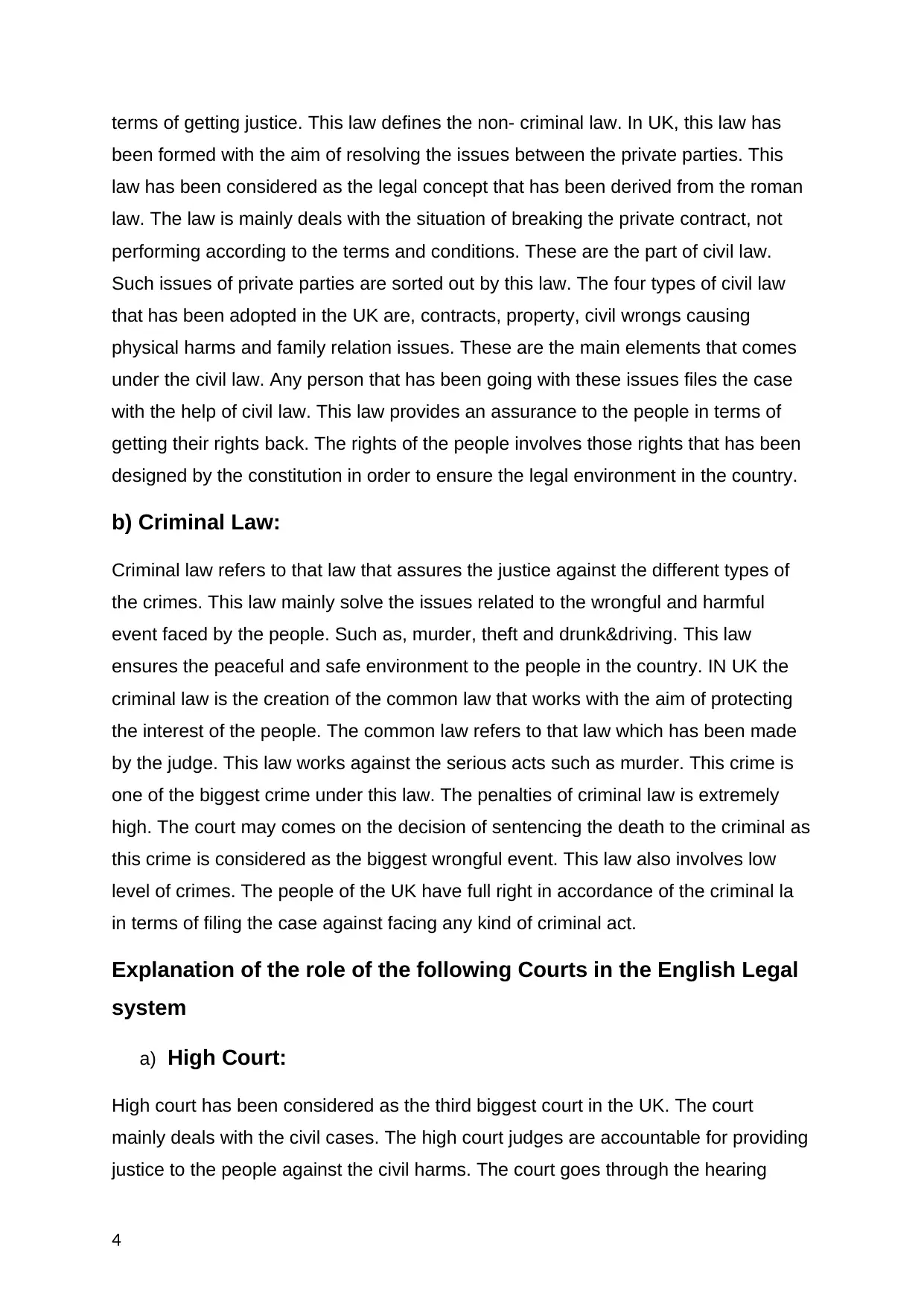
terms of getting justice. This law defines the non- criminal law. In UK, this law has
been formed with the aim of resolving the issues between the private parties. This
law has been considered as the legal concept that has been derived from the roman
law. The law is mainly deals with the situation of breaking the private contract, not
performing according to the terms and conditions. These are the part of civil law.
Such issues of private parties are sorted out by this law. The four types of civil law
that has been adopted in the UK are, contracts, property, civil wrongs causing
physical harms and family relation issues. These are the main elements that comes
under the civil law. Any person that has been going with these issues files the case
with the help of civil law. This law provides an assurance to the people in terms of
getting their rights back. The rights of the people involves those rights that has been
designed by the constitution in order to ensure the legal environment in the country.
b) Criminal Law:
Criminal law refers to that law that assures the justice against the different types of
the crimes. This law mainly solve the issues related to the wrongful and harmful
event faced by the people. Such as, murder, theft and drunk&driving. This law
ensures the peaceful and safe environment to the people in the country. IN UK the
criminal law is the creation of the common law that works with the aim of protecting
the interest of the people. The common law refers to that law which has been made
by the judge. This law works against the serious acts such as murder. This crime is
one of the biggest crime under this law. The penalties of criminal law is extremely
high. The court may comes on the decision of sentencing the death to the criminal as
this crime is considered as the biggest wrongful event. This law also involves low
level of crimes. The people of the UK have full right in accordance of the criminal la
in terms of filing the case against facing any kind of criminal act.
Explanation of the role of the following Courts in the English Legal
system
a) High Court:
High court has been considered as the third biggest court in the UK. The court
mainly deals with the civil cases. The high court judges are accountable for providing
justice to the people against the civil harms. The court goes through the hearing
4
been formed with the aim of resolving the issues between the private parties. This
law has been considered as the legal concept that has been derived from the roman
law. The law is mainly deals with the situation of breaking the private contract, not
performing according to the terms and conditions. These are the part of civil law.
Such issues of private parties are sorted out by this law. The four types of civil law
that has been adopted in the UK are, contracts, property, civil wrongs causing
physical harms and family relation issues. These are the main elements that comes
under the civil law. Any person that has been going with these issues files the case
with the help of civil law. This law provides an assurance to the people in terms of
getting their rights back. The rights of the people involves those rights that has been
designed by the constitution in order to ensure the legal environment in the country.
b) Criminal Law:
Criminal law refers to that law that assures the justice against the different types of
the crimes. This law mainly solve the issues related to the wrongful and harmful
event faced by the people. Such as, murder, theft and drunk&driving. This law
ensures the peaceful and safe environment to the people in the country. IN UK the
criminal law is the creation of the common law that works with the aim of protecting
the interest of the people. The common law refers to that law which has been made
by the judge. This law works against the serious acts such as murder. This crime is
one of the biggest crime under this law. The penalties of criminal law is extremely
high. The court may comes on the decision of sentencing the death to the criminal as
this crime is considered as the biggest wrongful event. This law also involves low
level of crimes. The people of the UK have full right in accordance of the criminal la
in terms of filing the case against facing any kind of criminal act.
Explanation of the role of the following Courts in the English Legal
system
a) High Court:
High court has been considered as the third biggest court in the UK. The court
mainly deals with the civil cases. The high court judges are accountable for providing
justice to the people against the civil harms. The court goes through the hearing
4
Paraphrase This Document
Need a fresh take? Get an instant paraphrase of this document with our AI Paraphraser
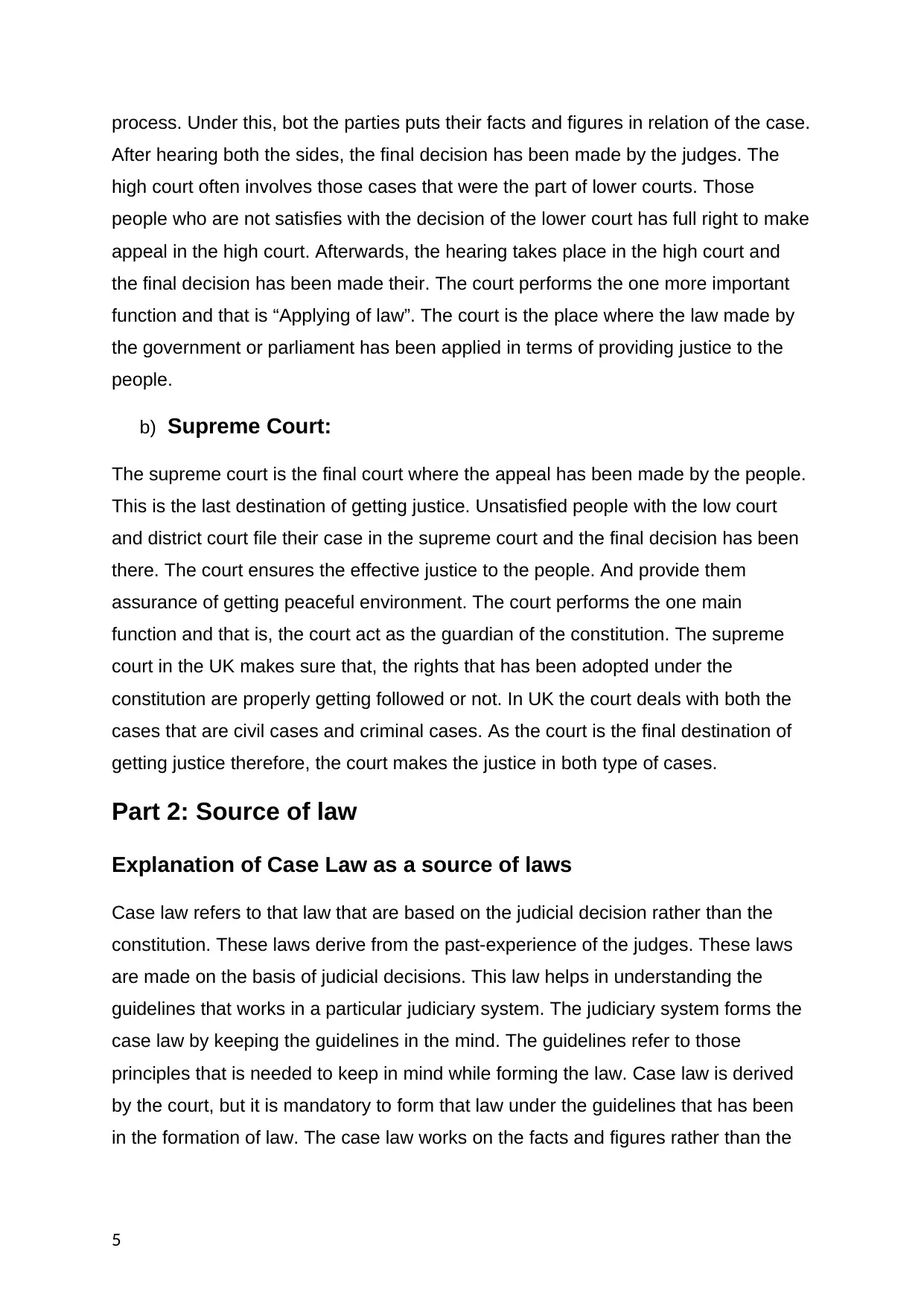
process. Under this, bot the parties puts their facts and figures in relation of the case.
After hearing both the sides, the final decision has been made by the judges. The
high court often involves those cases that were the part of lower courts. Those
people who are not satisfies with the decision of the lower court has full right to make
appeal in the high court. Afterwards, the hearing takes place in the high court and
the final decision has been made their. The court performs the one more important
function and that is “Applying of law”. The court is the place where the law made by
the government or parliament has been applied in terms of providing justice to the
people.
b) Supreme Court:
The supreme court is the final court where the appeal has been made by the people.
This is the last destination of getting justice. Unsatisfied people with the low court
and district court file their case in the supreme court and the final decision has been
there. The court ensures the effective justice to the people. And provide them
assurance of getting peaceful environment. The court performs the one main
function and that is, the court act as the guardian of the constitution. The supreme
court in the UK makes sure that, the rights that has been adopted under the
constitution are properly getting followed or not. In UK the court deals with both the
cases that are civil cases and criminal cases. As the court is the final destination of
getting justice therefore, the court makes the justice in both type of cases.
Part 2: Source of law
Explanation of Case Law as a source of laws
Case law refers to that law that are based on the judicial decision rather than the
constitution. These laws derive from the past-experience of the judges. These laws
are made on the basis of judicial decisions. This law helps in understanding the
guidelines that works in a particular judiciary system. The judiciary system forms the
case law by keeping the guidelines in the mind. The guidelines refer to those
principles that is needed to keep in mind while forming the law. Case law is derived
by the court, but it is mandatory to form that law under the guidelines that has been
in the formation of law. The case law works on the facts and figures rather than the
5
After hearing both the sides, the final decision has been made by the judges. The
high court often involves those cases that were the part of lower courts. Those
people who are not satisfies with the decision of the lower court has full right to make
appeal in the high court. Afterwards, the hearing takes place in the high court and
the final decision has been made their. The court performs the one more important
function and that is “Applying of law”. The court is the place where the law made by
the government or parliament has been applied in terms of providing justice to the
people.
b) Supreme Court:
The supreme court is the final court where the appeal has been made by the people.
This is the last destination of getting justice. Unsatisfied people with the low court
and district court file their case in the supreme court and the final decision has been
there. The court ensures the effective justice to the people. And provide them
assurance of getting peaceful environment. The court performs the one main
function and that is, the court act as the guardian of the constitution. The supreme
court in the UK makes sure that, the rights that has been adopted under the
constitution are properly getting followed or not. In UK the court deals with both the
cases that are civil cases and criminal cases. As the court is the final destination of
getting justice therefore, the court makes the justice in both type of cases.
Part 2: Source of law
Explanation of Case Law as a source of laws
Case law refers to that law that are based on the judicial decision rather than the
constitution. These laws derive from the past-experience of the judges. These laws
are made on the basis of judicial decisions. This law helps in understanding the
guidelines that works in a particular judiciary system. The judiciary system forms the
case law by keeping the guidelines in the mind. The guidelines refer to those
principles that is needed to keep in mind while forming the law. Case law is derived
by the court, but it is mandatory to form that law under the guidelines that has been
in the formation of law. The case law works on the facts and figures rather than the
5
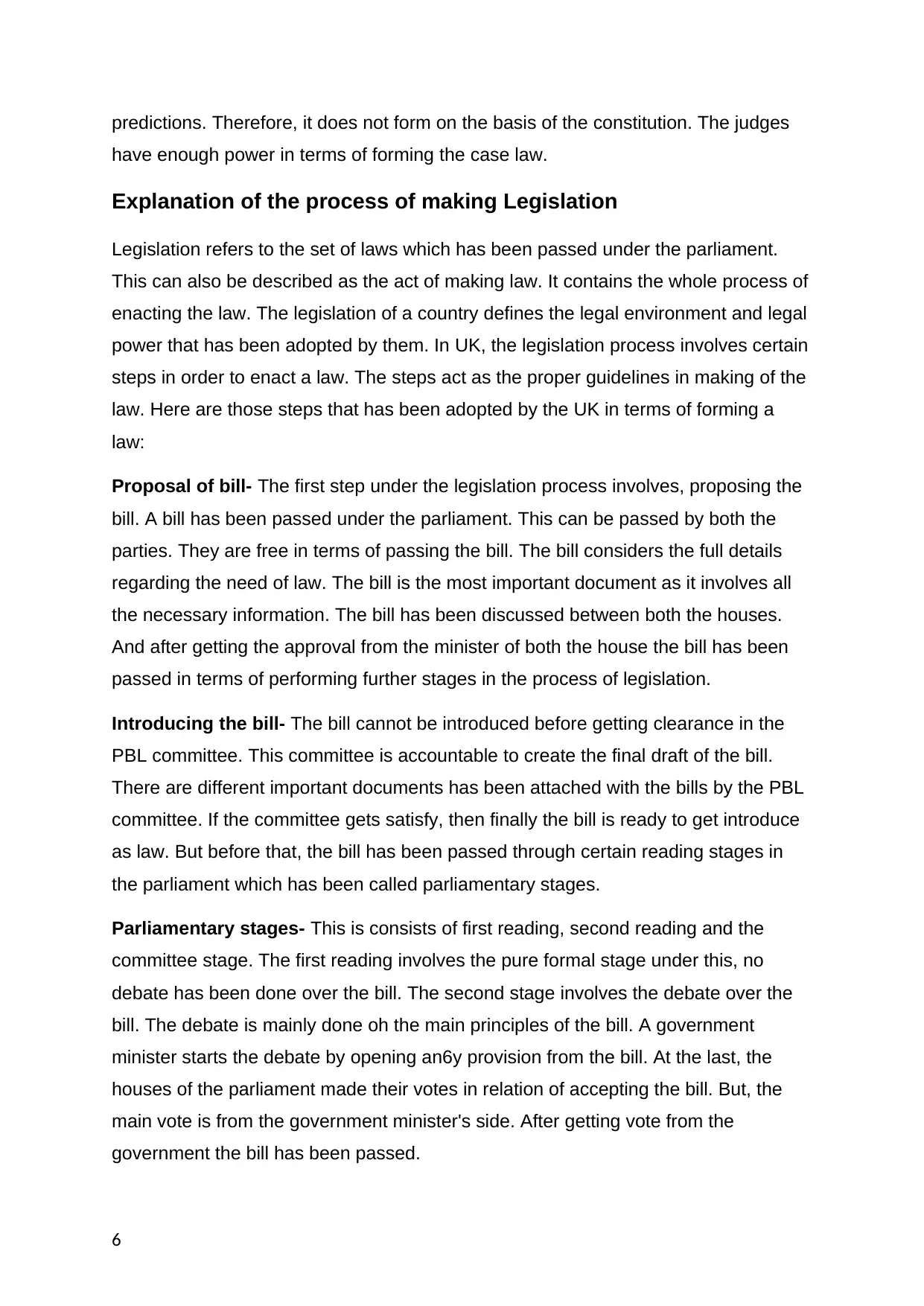
predictions. Therefore, it does not form on the basis of the constitution. The judges
have enough power in terms of forming the case law.
Explanation of the process of making Legislation
Legislation refers to the set of laws which has been passed under the parliament.
This can also be described as the act of making law. It contains the whole process of
enacting the law. The legislation of a country defines the legal environment and legal
power that has been adopted by them. In UK, the legislation process involves certain
steps in order to enact a law. The steps act as the proper guidelines in making of the
law. Here are those steps that has been adopted by the UK in terms of forming a
law:
Proposal of bill- The first step under the legislation process involves, proposing the
bill. A bill has been passed under the parliament. This can be passed by both the
parties. They are free in terms of passing the bill. The bill considers the full details
regarding the need of law. The bill is the most important document as it involves all
the necessary information. The bill has been discussed between both the houses.
And after getting the approval from the minister of both the house the bill has been
passed in terms of performing further stages in the process of legislation.
Introducing the bill- The bill cannot be introduced before getting clearance in the
PBL committee. This committee is accountable to create the final draft of the bill.
There are different important documents has been attached with the bills by the PBL
committee. If the committee gets satisfy, then finally the bill is ready to get introduce
as law. But before that, the bill has been passed through certain reading stages in
the parliament which has been called parliamentary stages.
Parliamentary stages- This is consists of first reading, second reading and the
committee stage. The first reading involves the pure formal stage under this, no
debate has been done over the bill. The second stage involves the debate over the
bill. The debate is mainly done oh the main principles of the bill. A government
minister starts the debate by opening an6y provision from the bill. At the last, the
houses of the parliament made their votes in relation of accepting the bill. But, the
main vote is from the government minister's side. After getting vote from the
government the bill has been passed.
6
have enough power in terms of forming the case law.
Explanation of the process of making Legislation
Legislation refers to the set of laws which has been passed under the parliament.
This can also be described as the act of making law. It contains the whole process of
enacting the law. The legislation of a country defines the legal environment and legal
power that has been adopted by them. In UK, the legislation process involves certain
steps in order to enact a law. The steps act as the proper guidelines in making of the
law. Here are those steps that has been adopted by the UK in terms of forming a
law:
Proposal of bill- The first step under the legislation process involves, proposing the
bill. A bill has been passed under the parliament. This can be passed by both the
parties. They are free in terms of passing the bill. The bill considers the full details
regarding the need of law. The bill is the most important document as it involves all
the necessary information. The bill has been discussed between both the houses.
And after getting the approval from the minister of both the house the bill has been
passed in terms of performing further stages in the process of legislation.
Introducing the bill- The bill cannot be introduced before getting clearance in the
PBL committee. This committee is accountable to create the final draft of the bill.
There are different important documents has been attached with the bills by the PBL
committee. If the committee gets satisfy, then finally the bill is ready to get introduce
as law. But before that, the bill has been passed through certain reading stages in
the parliament which has been called parliamentary stages.
Parliamentary stages- This is consists of first reading, second reading and the
committee stage. The first reading involves the pure formal stage under this, no
debate has been done over the bill. The second stage involves the debate over the
bill. The debate is mainly done oh the main principles of the bill. A government
minister starts the debate by opening an6y provision from the bill. At the last, the
houses of the parliament made their votes in relation of accepting the bill. But, the
main vote is from the government minister's side. After getting vote from the
government the bill has been passed.
6
⊘ This is a preview!⊘
Do you want full access?
Subscribe today to unlock all pages.

Trusted by 1+ million students worldwide
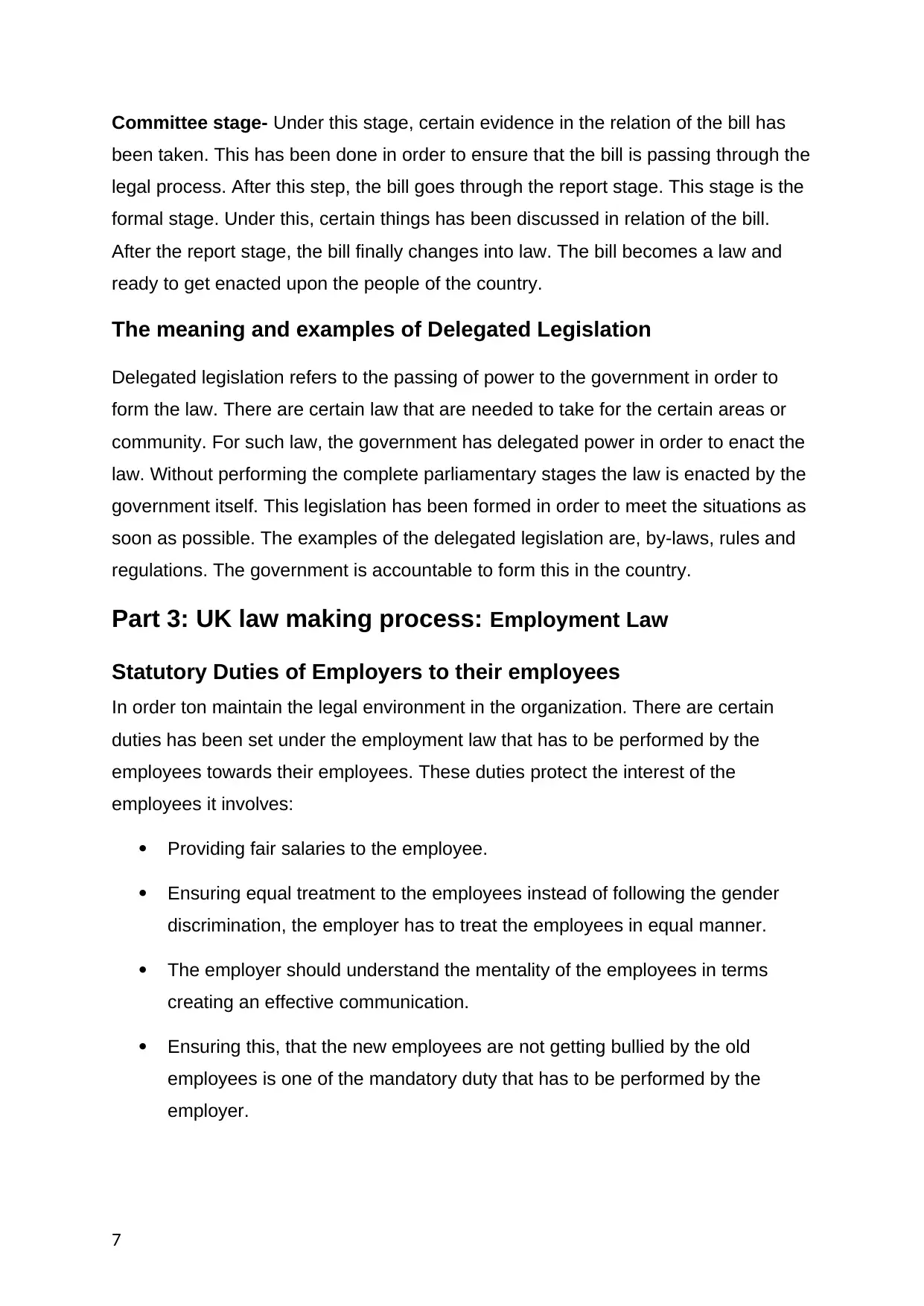
Committee stage- Under this stage, certain evidence in the relation of the bill has
been taken. This has been done in order to ensure that the bill is passing through the
legal process. After this step, the bill goes through the report stage. This stage is the
formal stage. Under this, certain things has been discussed in relation of the bill.
After the report stage, the bill finally changes into law. The bill becomes a law and
ready to get enacted upon the people of the country.
The meaning and examples of Delegated Legislation
Delegated legislation refers to the passing of power to the government in order to
form the law. There are certain law that are needed to take for the certain areas or
community. For such law, the government has delegated power in order to enact the
law. Without performing the complete parliamentary stages the law is enacted by the
government itself. This legislation has been formed in order to meet the situations as
soon as possible. The examples of the delegated legislation are, by-laws, rules and
regulations. The government is accountable to form this in the country.
Part 3: UK law making process: Employment Law
Statutory Duties of Employers to their employees
In order ton maintain the legal environment in the organization. There are certain
duties has been set under the employment law that has to be performed by the
employees towards their employees. These duties protect the interest of the
employees it involves:
Providing fair salaries to the employee.
Ensuring equal treatment to the employees instead of following the gender
discrimination, the employer has to treat the employees in equal manner.
The employer should understand the mentality of the employees in terms
creating an effective communication.
Ensuring this, that the new employees are not getting bullied by the old
employees is one of the mandatory duty that has to be performed by the
employer.
7
been taken. This has been done in order to ensure that the bill is passing through the
legal process. After this step, the bill goes through the report stage. This stage is the
formal stage. Under this, certain things has been discussed in relation of the bill.
After the report stage, the bill finally changes into law. The bill becomes a law and
ready to get enacted upon the people of the country.
The meaning and examples of Delegated Legislation
Delegated legislation refers to the passing of power to the government in order to
form the law. There are certain law that are needed to take for the certain areas or
community. For such law, the government has delegated power in order to enact the
law. Without performing the complete parliamentary stages the law is enacted by the
government itself. This legislation has been formed in order to meet the situations as
soon as possible. The examples of the delegated legislation are, by-laws, rules and
regulations. The government is accountable to form this in the country.
Part 3: UK law making process: Employment Law
Statutory Duties of Employers to their employees
In order ton maintain the legal environment in the organization. There are certain
duties has been set under the employment law that has to be performed by the
employees towards their employees. These duties protect the interest of the
employees it involves:
Providing fair salaries to the employee.
Ensuring equal treatment to the employees instead of following the gender
discrimination, the employer has to treat the employees in equal manner.
The employer should understand the mentality of the employees in terms
creating an effective communication.
Ensuring this, that the new employees are not getting bullied by the old
employees is one of the mandatory duty that has to be performed by the
employer.
7
Paraphrase This Document
Need a fresh take? Get an instant paraphrase of this document with our AI Paraphraser
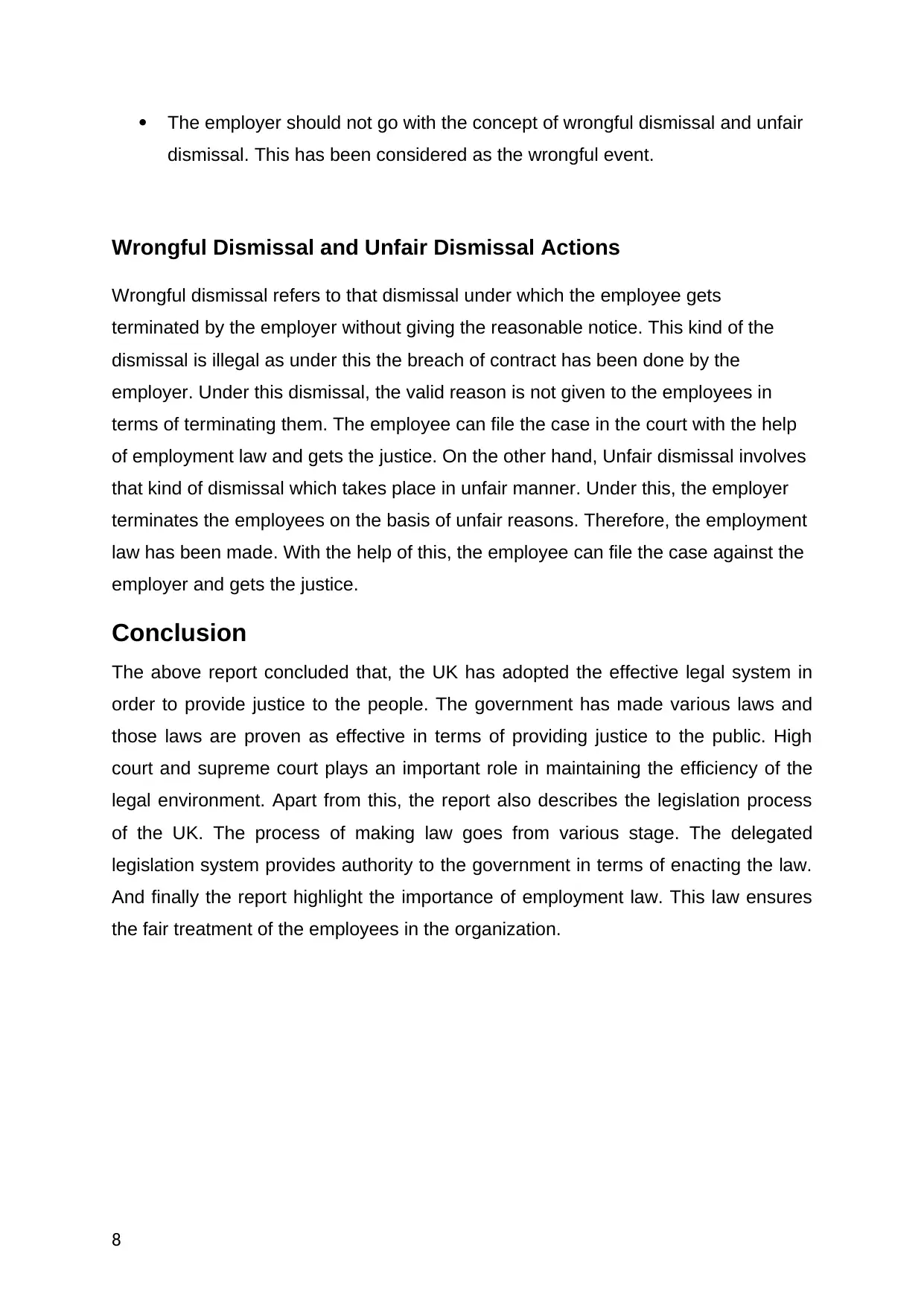
The employer should not go with the concept of wrongful dismissal and unfair
dismissal. This has been considered as the wrongful event.
Wrongful Dismissal and Unfair Dismissal Actions
Wrongful dismissal refers to that dismissal under which the employee gets
terminated by the employer without giving the reasonable notice. This kind of the
dismissal is illegal as under this the breach of contract has been done by the
employer. Under this dismissal, the valid reason is not given to the employees in
terms of terminating them. The employee can file the case in the court with the help
of employment law and gets the justice. On the other hand, Unfair dismissal involves
that kind of dismissal which takes place in unfair manner. Under this, the employer
terminates the employees on the basis of unfair reasons. Therefore, the employment
law has been made. With the help of this, the employee can file the case against the
employer and gets the justice.
Conclusion
The above report concluded that, the UK has adopted the effective legal system in
order to provide justice to the people. The government has made various laws and
those laws are proven as effective in terms of providing justice to the public. High
court and supreme court plays an important role in maintaining the efficiency of the
legal environment. Apart from this, the report also describes the legislation process
of the UK. The process of making law goes from various stage. The delegated
legislation system provides authority to the government in terms of enacting the law.
And finally the report highlight the importance of employment law. This law ensures
the fair treatment of the employees in the organization.
8
dismissal. This has been considered as the wrongful event.
Wrongful Dismissal and Unfair Dismissal Actions
Wrongful dismissal refers to that dismissal under which the employee gets
terminated by the employer without giving the reasonable notice. This kind of the
dismissal is illegal as under this the breach of contract has been done by the
employer. Under this dismissal, the valid reason is not given to the employees in
terms of terminating them. The employee can file the case in the court with the help
of employment law and gets the justice. On the other hand, Unfair dismissal involves
that kind of dismissal which takes place in unfair manner. Under this, the employer
terminates the employees on the basis of unfair reasons. Therefore, the employment
law has been made. With the help of this, the employee can file the case against the
employer and gets the justice.
Conclusion
The above report concluded that, the UK has adopted the effective legal system in
order to provide justice to the people. The government has made various laws and
those laws are proven as effective in terms of providing justice to the public. High
court and supreme court plays an important role in maintaining the efficiency of the
legal environment. Apart from this, the report also describes the legislation process
of the UK. The process of making law goes from various stage. The delegated
legislation system provides authority to the government in terms of enacting the law.
And finally the report highlight the importance of employment law. This law ensures
the fair treatment of the employees in the organization.
8

9
⊘ This is a preview!⊘
Do you want full access?
Subscribe today to unlock all pages.

Trusted by 1+ million students worldwide
1 out of 9
Related Documents
Your All-in-One AI-Powered Toolkit for Academic Success.
+13062052269
info@desklib.com
Available 24*7 on WhatsApp / Email
![[object Object]](/_next/static/media/star-bottom.7253800d.svg)
Unlock your academic potential
Copyright © 2020–2025 A2Z Services. All Rights Reserved. Developed and managed by ZUCOL.

